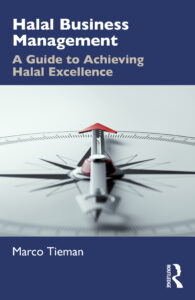Interview with Prof. Dr. Marco Tieman on his book ‘Halal Business Management: A guide to achieving halal excellence’
With the Halal industry now entering into the global marketplace, HalalFocus interviewed Prof. Dr. Marco Tieman on his timely new book ‘Halal Business Management: A guide to achieving halal excellence’. Companies doing business in Muslim markets will benefit from the practical advice given in this book on how best to organise and upscale halal business operations. The book is also intended as a coursebook for graduate and postgraduate education in halal business management.
Let’s get started with what prompted you write this book?
I have been a researcher on halal supply chain management since 2006, when I started with my PhD on the application of halal in supply chain management (focusing on halal food supply chains). To my knowledge I was the first person to conduct academic research on halal supply chain management. Upon completion of my PhD in 2013, I continued my academic career in this new field part-time. Since 2006 I have been advisor to both governments and the private sector on how best to organise halal operations, halal supply chains, and halal clusters.
Over the past five years I extended my research towards halal risk and reputation management, purely out of interest to study the many halal crises with top brands getting into trouble in Muslim markets. Where did they go wrong? How could these halal issues that rise up be prevented? How can companies better protect and prepare themselves when operating in Muslim markets
With close to 15 years of experience as a researcher and advisor to halal industries, I thought it was time to share this important knowledge with the world. I also noticed that business schools in Islamic countries did not teach about halal business management. As the Muslim world has a limited and even reducing role in the halal value chain, it is time to educate the new generation of business elites in the Muslim world about halal business management. I have also created an MBA module ‘Halal Business Management’ for universities to adopt this module in their education programmes.
What can the reader hope to learn by reading this book?
The halal industry is a fast-growing industry, expanding fast beyond food into personal care, pharmaceuticals, industrial products, fashion, and services. It is complex and highly dynamic in nature. Firstly, following the Halal standards, which are still not globally agreed on, so still vary in different regions. Then moving towards a halal supply chain and value chain approach.
In fact, just last month the Organisation of Islamic Cooperation (OIC), through The Standards and Metrology Institute for the Islamic Countries(SMIIC), introduced an international halal supply chain management system standard: OIC/SMIIC 17:2020. This new standard is a true game changer, facilitating a transition towards a halal supply chain approach.
Halal business management is about halal certification, halal supply chain management, halal branding and marketing, and halal risk and reputation management. These are the key themes of my book. Chapters include the world of halal, halal assurance system, the halal supply chain, halal purchasing, halal logistics and retailing, halal clusters, halal branding, halal marketing, halal risk management, and halal reputation management.
Who would benefit from your book?
It is first of all targeted as a business book for companies doing business in Muslim markets, providing practical advice how best to organise and upscale halal business operations.
Second, it will help governments in both Muslim and non-Muslim countries that are looking to create a sound halal eco-system. Most Muslim countries have high population growth, with low productivity in the agriculture sector, and are net importers of agri-foods. The Muslim world needs urgent investments in creating halal food production clusters. Also, non-Muslim countries benefit by creating halal production clusters to improve production and export of halal products, better meeting the complex requirements of the Muslim markets
This book is also a coursebook for graduate and postgraduate education in halal business management. A halal business management module is urgently needed in business schools in Islamic countries to educate the new generation of business elites. The halal industry needs new halal brands from the Muslim world, which is currently dominated by brands from non-Muslim countries.
This course could also be an attractive elective for non-Muslim countries with high Muslim population; or for countries that are major exporters to the Muslim world, like for example Thailand, China, Brazil, Australia and New Zealand).
What will you be doing next on the topic of ‘Halal Business Management’?
There has been a huge interest by companies, Muslim associations, and universities to share my knowledge on halal business management through a 3-day MasterClass on Halal Business Management. The first public MasterClasses will be held next year in Malaysia, Indonesia and South Africa. There is an overview of the MasterClasses organised on my book website: www.halalbusinessmanagement.com.
Halal Business Management is published by Routledge in London and distributed worldwide. The author also has a website www.halalbusinessmanagement.com, where you can find the list of bookstores where you can buy the book in your country.
Prof. Dr. Marco Tieman is the founder and Chief Executive Officer of LBB International, a supply chain strategy consultancy & research firm in the area of procurement, production, and supply chain management. He is a full professor with Help University and a research fellow with the Universiti Malaya Halal Research Centre in Malaysia, conducting research in halal purchasing, halal supply chain management, and halal risk and reputation management. He won various academic awards for his research in halal purchasing and halal supply chain management.
This article was published in HalalFocus on 13 December 2020.

